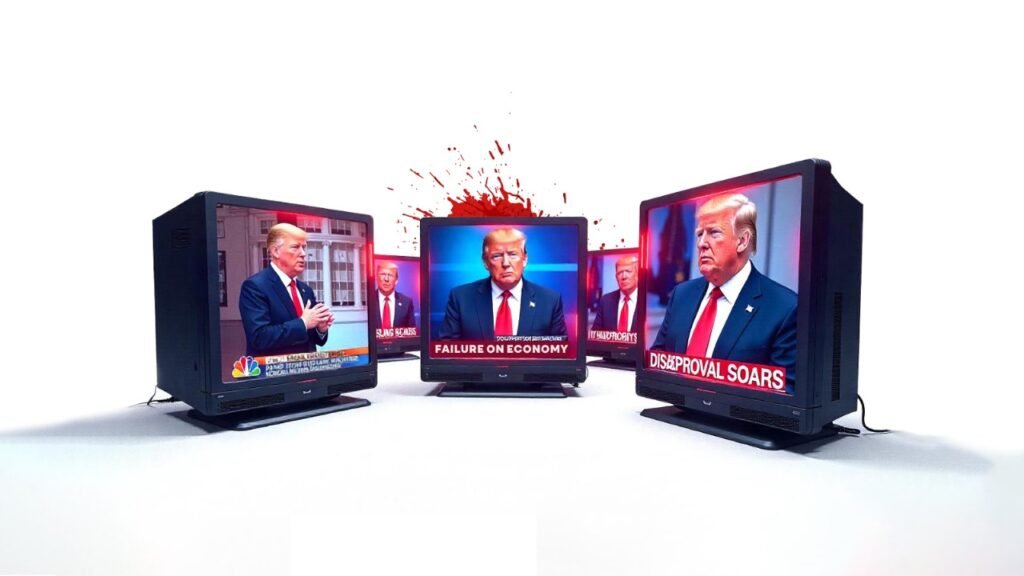In an age where the media landscape has become as polarized as the political sphere it covers, the relentless focus on President Donald Trump’s approval ratings in left-leaning outlets, such as NBC News, has crossed from mere critique into a calculated attempt to defame. While no political figure is immune from scrutiny, the disproportionate attention placed on Trump’s perceived flaws by these outlets reveals more about the media’s bias than it does about the reality of his presidency. By repeatedly highlighting his low approval numbers, particularly on issues like the economy and trade, and dismissing his substantial achievements, these outlets are constructing a narrative of failure that overlooks the complexities of his tenure and the true impact of his policies.
The latest NBC poll, published with much fanfare, reported that Trump’s approval rating stood at 46%, with a disapproval rating of 50%. At first glance, this poll appears damning. However, upon closer inspection, the glaring omission is the media’s failure to recognize the broader context. Yes, Trump’s approval is far from perfect, but it is far from disastrous either. In fact, a 46% approval rating for a president who has faced unprecedented challenges — from investigations into his campaign to an impeachment — is notable not for its weakness, but for its resilience. This approval rating represents a base that remains firmly behind him, a foundation for a potential comeback in the face of deep polarization.
The media, however, has chosen to obsess over the negative aspects of Trump’s presidency. The poll’s reporting tends to focus on the 54% disapproval of his economic policies, yet fails to contextualize the impressive economic recovery under his administration pre-pandemic, the lowest unemployment rates for African Americans and Hispanics in history, and the substantial tax reforms that spurred business growth. The focus on the 48% of Americans who claim they are worse off financially fails to acknowledge the reality of a global pandemic, which affected economies worldwide, including America’s. The downturn in the economy is, by most accounts, more attributable to COVID-19 than to any failures of the Trump administration. Yet, the media’s strategy is to link Trump’s leadership directly to economic hardship, leaving little room for nuanced discussion of the external factors at play.
Moreover, the media narrative ignores the long-term effects of Trump’s policies, particularly in the areas of deregulation and tax reform. His administration cut corporate taxes, incentivized businesses to repatriate capital, and eased burdens on American manufacturers — policies that laid the groundwork for economic growth even during the pandemic’s initial phases. These accomplishments are glossed over or downplayed because they do not fit the negative narrative that outlets like NBC seek to project. Trump’s foreign policy achievements, including the historic Abraham Accords that brought Israel and several Arab nations into peace agreements, are similarly minimized in favor of focusing on what is framed as his more controversial actions.
In the realm of trade, NBC News highlights a mere 39% approval of Trump’s policies, particularly regarding tariffs. This figure, though true, fails to reflect the nuanced reality of Trump’s trade war with China, which was aimed at rebalancing America’s trade deficits and securing better deals for American workers. While the media has often framed the tariffs as a blunder, the reality is more complicated. The tariffs pressured China to make substantial concessions in trade deals, such as intellectual property protections and fairer market access. Furthermore, the ultimate agreement between the U.S. and China was heralded by economists as a win for American labor, even if the immediate effects were mixed.
The same can be said about Trump’s handling of immigration, another focal point for left-leaning media. The portrayal of his immigration policies as harsh and ineffective ignores the success of his administration in significantly reducing illegal immigration at the southern border. The construction of border walls, alongside strengthened immigration enforcement, led to a substantial decrease in illegal crossings — a reality at odds with the media’s depiction of a failed border policy. Instead, the media chooses to highlight the images of families separated at the border, a situation that had roots in previous administrations as well, but which is selectively framed to tarnish Trump’s image.
It is telling that when left-leaning outlets report on Trump’s approval rating, they often neglect to mention the robust support he still maintains among Republicans, which in the latest poll stands at a staggering 90%. This loyalty, in the face of constant negative press, speaks to a deeper truth that the media would rather ignore: Trump’s political strategies, from his tough stance on immigration to his “America First” foreign policy, resonate deeply with a significant portion of the American electorate. His ability to maintain such unwavering support suggests that, contrary to the media narrative, he has been able to connect with many Americans in ways that transcends the simplistic analysis of approval ratings.
The bottom line is that the media’s fixation on Trump’s flaws and disapproval ratings is not just a journalistic endeavor — it is a deliberate strategy to delegitimize his presidency and tarnish his legacy. While no president is without fault, Trump’s record is far from one-dimensional. By failing to acknowledge his accomplishments, particularly in economic recovery, foreign policy, and immigration reform, the media has chosen to present a distorted view of his presidency. The true picture of Trump’s rule is far more complex than the dismal approval ratings that left-leaning outlets are so eager to highlight.




